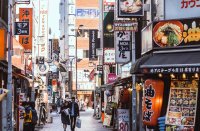Data shows that Japan has suffered its worst quarter since 2014. Economics fear that Japan could fall into recession this year, especially with the coronavirus that is hitting countries on the bad sides.
Real GDP in Japan plunged 6.3% on an annualized basis in Q4 2019. pic.twitter.com/cqB3vbCSC3
— Eric Basmajian (@EPBResearch) February 17, 2020
According Eric Basmajian, “GDP in Japan plunged 6.3% on an annualized basis in the fourth quarter of 2019.” This is a result of consumer spending fell sharply, business investment dropped and sale tax hiked. According to a BBC article, other contributing reasons are major typhoon during summer and the weak global demand.
This drop is the biggest shrink since the second quarter of 2014, when consumption took a hit from a sales tax that hiked during that time.
The same BBC article pointed out that “Japanese consumer spending fell 2.9% after the country’s sales tax was raised in October to 10% from 8%. In the same month Typhoon Hagibis hit large parts of the country.”
BREAKING: Japan’s economy shrank by the most in more than 5 years last quarter, fueling recession concerns. GDP fell at an annualized pace of 6.3% from the previous quarter. https://t.co/U32pEhawDi pic.twitter.com/g770944Kb0
— Bloomberg (@business) February 17, 2020
The situation is concerning because Japan is one the three biggest economy and according to this trend, the country’s economy is likely to fall into recession.
With the coronavirus seriously attacking Asia’s economic, the country’s economy is most likely to continue to shrink. In a CNBC article, they interviewed Taro Saito, executive research fellow at NLI Research Institute, saying that “There’s a pretty good chance the economy will suffer another contraction in January-March. The virus will mainly hit inbound tourism and exports, but could also weigh on domestic consumption quite a lot. If this epidemic is not contained by the time of the Tokyo Olympic Games, the damage to the economy will be huge.”
Japan 🇯🇵 GDP collapses 6.3% in the three months through December, the biggest slide since a previous tax increase in 2014, and massively worse than consensus (-3.8%). https://t.co/NrTtwTUKG6
— Daniel Lacalle (@dlacalle_IA) February 17, 2020
The economic consequences of the virus are already directly impacting Japan’s industries. For example, earlier this month Nissan announced that they were going to temporarily shut one of its factories because it could not get parts from China.
The similar situation also applied to Hyundai. In the beginning of this month, the company announced that they are closing its factories in South Korea due to the shortage of Chinese parts, according to BBC news.
Other car factories that rely on China like Fiat is also considering to temporarily shut down production because of the difficulty in sourcing parts from China.
Despite car industries, airlines and transportation industries are also suffering from the widespread of virus. Airline Cathay Pacific has slashed its profit forecasts after the pandemic occurred. Air Canada is also cancelling flights due to the lack of passengers.
Japan’s economy has already been staggered by a devastating typhoon and a wallet-shutting tax increase. Now, the coronavirus threatens to knock Japan into a full-blown recession. https://t.co/uOnzIYomHD
— The New York Times (@nytimes) February 18, 2020
After the release of data, Economy Minister Yasutoshi Nishimura said the government was ready to take all necessary steps and was watching the impact the coronavirus outbreak could have on the economy and specifically tourism, according to CNBC news.
The news article pointed out that “The government had hoped Japan’s economy would continue a moderate recovery. But we must be vigilant against the impact of the coronavirus on domestic and overseas economies”.
According to the Guardian, “Japanese bank Nomura has predicted that China’s economy is facing its biggest slowdown since the Tiananmen Square massacre in 1989.”
Tokyo 2020 is coming up soon. Hopefully, it will encourage more tourism visit hence encourage consumption growth.
This is what Japanification really looks like. Despite Abenomics, Japan is now in its fifth recession since 2008. More here: https://t.co/FPfaiHHWGQ pic.twitter.com/LPEDeB6VbH
— Lakshman Achuthan (@businesscycle) February 21, 2020














































